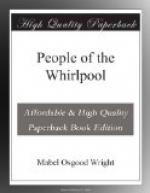So the last entry in the “Garden Boke” was made a week before the day recorded in the white book with the cherubs’ heads painted on it that underlies the shoes.
It seems both strange and significant to me now that this book chanced to be given me by Lavinia Dorman, mother’s school friend and bridesmaid, a spinster of fifty-five, and was really the beginning of the transfer of her friendship to me, the only woman friendship that I have ever had, and its quality has that fragrant pungence that comes from sweet herbs, that of all garden odours are the most lasting.
I suppose that it is one of the strongest human habits to write down the very things that one is least likely to forget, and vice-versa; for certainly I shall never forget the date and double record on that first fair page beneath the illuminated word Born,—yet I often steal up here to peep at it,—and live the intervening five years backward for pure joy. January 10, 189-, Richard Russell------ and John Evan------.
Every time I read the names anew I wonder what I should have done if there had been a single name upon the page. I must then have chosen between naming him for father or Evan—an impossibility; for even if the names had been combined, whose should I have put first?
No, the twins are in every way an advantage. To Evan, in providing him at once with a commuted family sufficient for his means; to father, among other reasons, by giving him the pleasure of saying, to friends who felt it necessary to visit him in the privacy of his study and be apologetically sympathetic, “I have observed that the first editions of very important books are frequently in two volumes,” sending them away wondering what he really meant; to me by saving the rack of argument, the form of evil I most detest, and to their own chubby selves no less, in that neither one has been handicapped for a single day by the disadvantage of being an only child!
It doubtless seems very odd for me to feel this last to be a disadvantage, being myself an only child, and always a happy one, sharing with mother all the space in father’s big heart. But this is because God has been very good to me, leaving me safe in the shelter of the home nest. Suppose it had been otherwise and I had been forced to face the world, how it would have hurt, for individual love is cruelly precious sometimes, and an “onliest” cannot in the very nature of things be as unselfish and adaptable as one of many.
I was selfish even when the twins came. I was so glad that they were men-children. I could not bear to think of other woman hands ministering to father and Evan, and I rejoiced in the promise of two more champions. I often wonder how mother felt when I was born and what she thought. Was she glad or disappointed? I wish that she had left written words to guide me, if ever so few,—they would mean so much now; and let me know if in her day social things surprised and troubled her as for the first time they now stir me, and therefore belong to all awakening motherhood. Her diaries were a blending of simple household happenings and garden lore, nothing more; for when I was five years old and her son came, he stayed but a few short hours and then stole her away with him.




